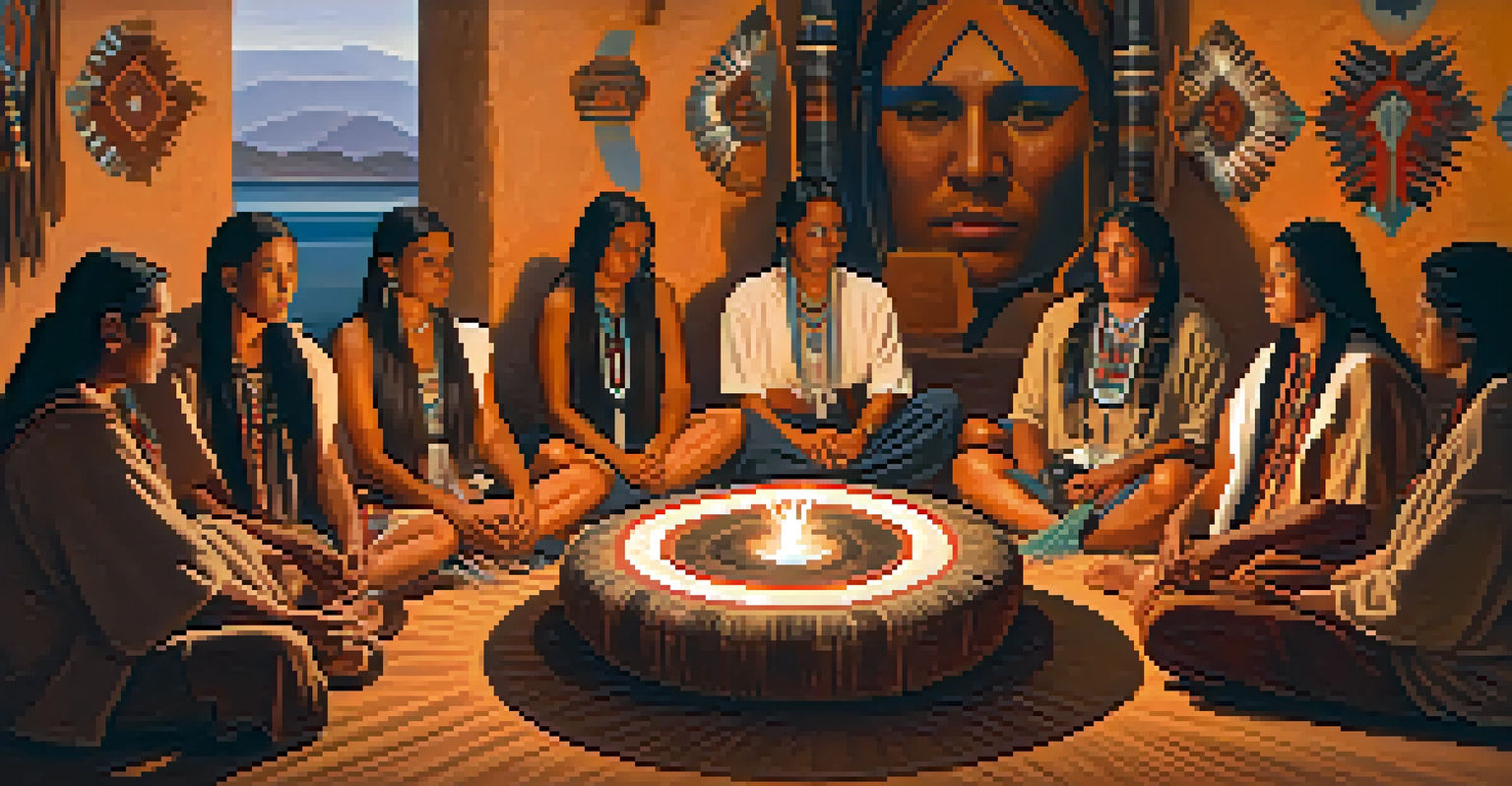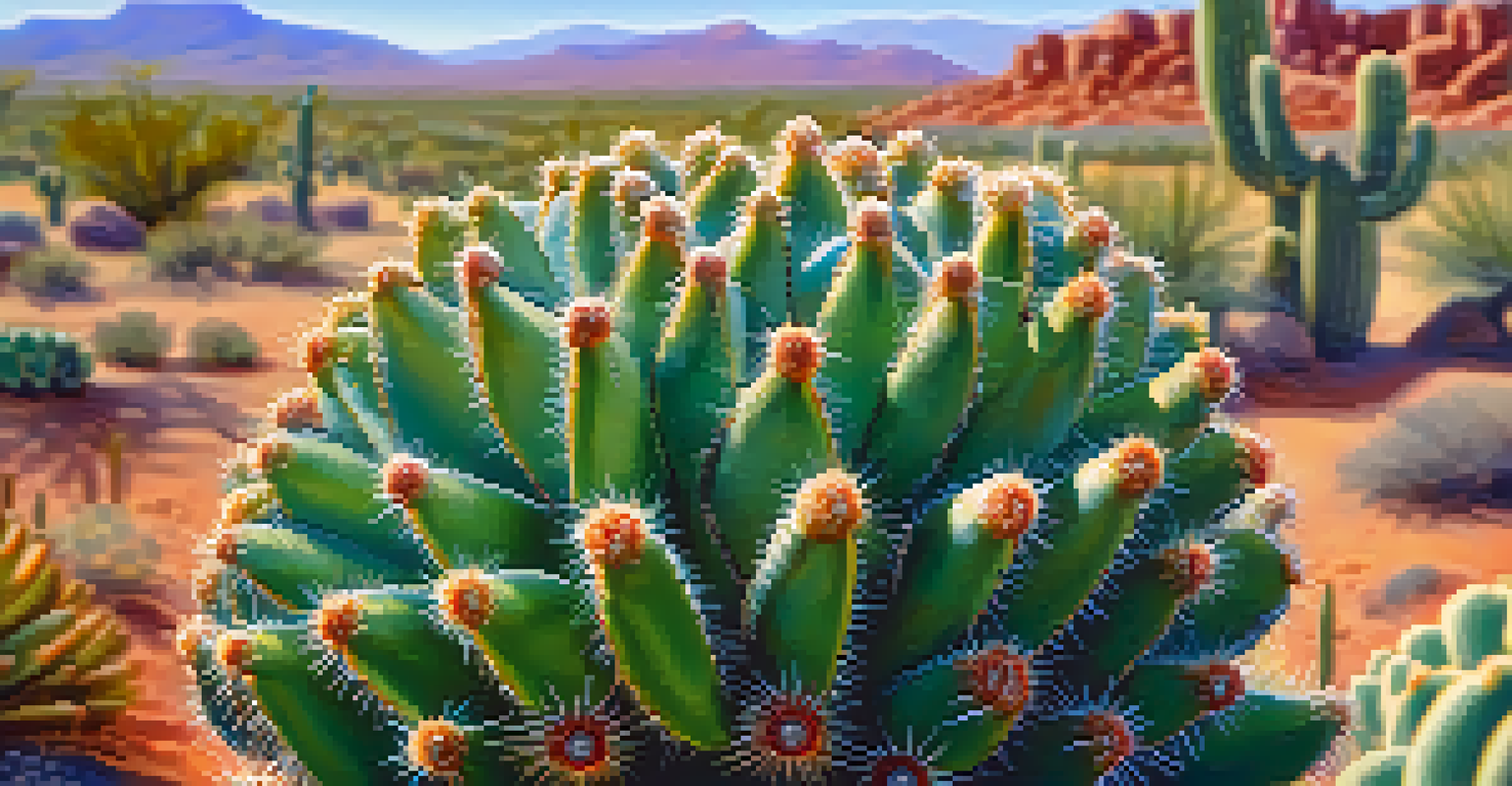Peyote and Spiritual Healing Among Native American Tribes

Understanding Peyote: A Hallucinogenic Cactus
Peyote, a small cactus native to Mexico and the southwestern United States, is renowned for its psychoactive properties. The active compound, mescaline, induces altered states of consciousness, often leading to profound spiritual experiences. For many Native American tribes, peyote is not just a plant; it's a sacred medicine, deeply intertwined with their cultural and spiritual practices.
The use of peyote is not merely about the substance itself; it's about the shared experiences and teachings that have been passed down through generations.
The cactus has been used for thousands of years in various ceremonies, serving as a bridge between the physical and spiritual realms. Peyote is often consumed during rituals to promote healing, self-discovery, and connection with the divine. This unique relationship with peyote highlights the significance of nature in Native American spirituality.
As we dive deeper into the spiritual healing practices involving peyote, it’s essential to recognize how these traditions foster a sense of community, identity, and continuity among tribes. The use of peyote isn't merely about the substance itself; it's about the shared experiences and teachings that have been passed down through generations.
The Role of Peyote in Native American Spirituality
For Native American tribes, peyote serves as a spiritual guide, offering insights and wisdom during ceremonies. These gatherings often involve singing, prayer, and storytelling, creating an immersive environment for participants. The collective experience fosters a sense of belonging and reinforces cultural ties, making peyote an essential element of their spiritual identity.

The use of peyote is often associated with the Native American Church, which integrates traditional practices with Christianity. This synthesis allows for a unique expression of faith, where peyote rituals become a means of healing and connection to a higher power. Participants often report profound revelations and emotional releases, illustrating the transformative potential of these ceremonies.
Peyote as Sacred Medicine
Peyote is revered by Native American tribes as a sacred plant that facilitates spiritual healing and connection.
Moreover, the rituals surrounding peyote consumption emphasize respect for the plant and the spiritual journey it facilitates. This reverence reflects a deep understanding of the interconnectedness of all life, a core tenet of Native American spirituality that encourages harmony and balance.
Cultural Significance of Peyote Rituals
Peyote rituals are not only about individual healing; they also serve a vital role in preserving cultural heritage. These ceremonies provide a space for storytelling, where elders pass down ancestral knowledge and teachings. Such practices help maintain the continuity of tribal traditions, ensuring that younger generations remain connected to their roots.
Peyote serves as a spiritual guide, offering insights and wisdom during ceremonies.
In many tribes, peyote ceremonies are held during significant life events, such as weddings or healing gatherings. These occasions reinforce community bonds and allow participants to share their experiences and support one another. By embedding peyote into these rituals, tribes affirm their identity and resilience in the face of external challenges.
The cultural significance of peyote rituals extends beyond the individual and community; they also challenge societal perceptions of Native American spirituality. By openly practicing and sharing these traditions, tribes assert their rights to cultural expression and self-determination, promoting a deeper understanding of their beliefs in the broader society.
Peyote and Healing: A Holistic Approach
The healing practices involving peyote are holistic, addressing physical, emotional, and spiritual needs. Participants often seek peyote ceremonies to find relief from various ailments, including addiction, depression, and trauma. The collective experience allows individuals to confront their struggles in a supportive environment, promoting healing and personal growth.
During the ceremonies, guided introspection, meditation, and communal support play crucial roles in the healing process. The effects of peyote can facilitate deep emotional releases, enabling participants to process and heal from past traumas. This holistic approach combines traditional wisdom with the therapeutic potential of peyote, showcasing its power as a healing agent.
Cultural Heritage and Community
Peyote rituals play a crucial role in preserving cultural heritage and fostering community bonds among tribes.
Furthermore, the emphasis on community in these healing rituals reinforces the idea that healing is not an individual journey but a shared experience. By coming together, participants build strong support networks that continue long after the ceremonies, fostering ongoing mental and emotional health.
Challenges and Misunderstandings Surrounding Peyote Use
Despite its deep cultural significance, peyote use faces numerous challenges, particularly from legal and societal perspectives. Misunderstandings about the plant often lead to stigmatization, causing many to view it solely as a recreational drug. This misconception undermines the spiritual and healing aspects of peyote, which are central to many Native American tribes.
Legal barriers also pose significant challenges for tribes wishing to practice their traditions. While the Native American Church has secured some protections for peyote use, the plant's legal status remains complex and varies by region. These restrictions can hinder the ability of tribes to engage in their sacred ceremonies, impacting cultural preservation and spiritual practice.
Navigating these challenges requires continuous advocacy and education to promote a better understanding of peyote's role in Native American spirituality. By sharing their stories and experiences, tribes can help dispel myths and foster respect for their traditions, ultimately paving the way for greater acceptance and recognition.
The Future of Peyote in Native American Spirituality
As we look to the future, the role of peyote in Native American spirituality remains both promising and uncertain. On one hand, growing interest in indigenous practices and holistic healing approaches has sparked renewed appreciation for peyote rituals. This shift presents opportunities for greater dialogue and understanding between tribes and the broader society.
On the other hand, the sustainability of peyote itself is a pressing concern. Overharvesting and environmental factors threaten the survival of this sacred plant, prompting tribes to advocate for responsible use and conservation efforts. Ensuring the availability of peyote for future generations is essential for maintaining the cultural and spiritual practices that rely on it.
Challenges to Peyote Practices
Legal and societal challenges threaten the practice and understanding of peyote's spiritual significance.
Ultimately, the future of peyote in Native American spirituality will depend on the balance between preservation and adaptation. By embracing both traditional practices and modern advocacy, tribes can continue to honor their heritage while ensuring that peyote remains a vital part of their spiritual journey.
Conclusion: Embracing the Wisdom of Peyote
Peyote and its role in spiritual healing among Native American tribes offer valuable insights into the intersection of culture, spirituality, and health. These ceremonies reveal the profound connections between individuals, their communities, and the natural world. By understanding and respecting these practices, we can foster a greater appreciation for indigenous wisdom and its relevance today.
As we navigate contemporary challenges, the teachings of peyote rituals remind us of the importance of holistic healing and community support. Emphasizing emotional and spiritual well-being, these traditions encourage us to seek balance in our lives and recognize the interconnectedness of all beings.

In embracing the wisdom of peyote, we honor the rich cultural heritage of Native American tribes and contribute to a broader dialogue about spirituality and healing in our society. By learning from these practices, we can cultivate a more compassionate and understanding world, where diverse spiritual traditions are celebrated and respected.